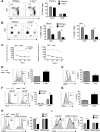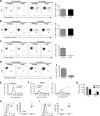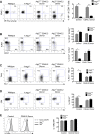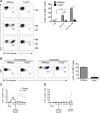Autophagy is a critical regulator of memory CD8(+) T cell formation
- PMID: 25385531
- PMCID: PMC4225493
- DOI: 10.7554/eLife.03706
Autophagy is a critical regulator of memory CD8(+) T cell formation
Abstract
During infection, CD8(+) T cells initially expand then contract, leaving a small memory pool providing long lasting immunity. While it has been described that CD8(+) T cell memory formation becomes defective in old age, the cellular mechanism is largely unknown. Autophagy is a major cellular lysosomal degradation pathway of bulk material, and levels are known to fall with age. In this study, we describe a novel role for autophagy in CD8(+) T cell memory formation. Mice lacking the autophagy gene Atg7 in T cells failed to establish CD8(+) T cell memory to influenza and MCMV infection. Interestingly, autophagy levels were diminished in CD8(+) T cells from aged mice. We could rejuvenate CD8(+) T cell responses in elderly mice in an autophagy dependent manner using the compound spermidine. This study reveals a cell intrinsic explanation for poor CD8(+) T cell memory in the elderly and potentially offers novel immune modulators to improve aged immunity.
Keywords: ageing; autophagy; immunology; influenza; memory T cells; mouse; spermidine; vaccination.
Conflict of interest statement
The authors declare that no competing interests exist.
Figures














Comment in
-
New roles for autophagy and spermidine in T cells.Microb Cell. 2015 Mar 2;2(3):91-93. doi: 10.15698/mic2015.03.195. Microb Cell. 2015. PMID: 28357282 Free PMC article.
References
Publication types
MeSH terms
Substances
Grants and funding
LinkOut - more resources
Full Text Sources
Other Literature Sources
Molecular Biology Databases
Research Materials

